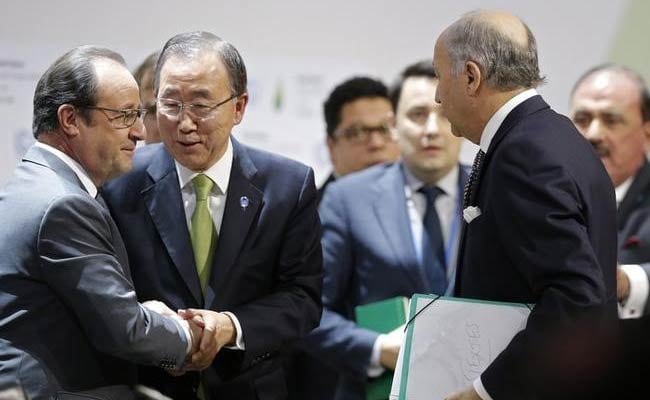
French President Francois Hollande (L) shakes hands with United Nations Secretary-General Ban Ki-moon (C) near Foreign Affairs Minister Laurent Fabius (C), President-designate of COP21, at the World Climate Change Conference 2015 (COP21).
Beijing:
Top emitter China today welcomed the landmark Paris climate agreement, saying it is fair in splitting responsibility between developed and developing countries and heralded "a new beginning in international cooperation".
"We appreciate the efforts that all parties have made, especially host country France," Foreign Ministry spokesperson Hong Lei said.
"China has always promoted relative negotiations, and we will continue to work with the international community to deal with global climate change," he said.
Adopted by the 196 parties of the United Nations Framework Convention on Climate Change, the Paris Agreement sets a target of holding the global average rise in temperature below 2 degrees Celsius above pre-industrial levels, and preferably below 1.5 degrees.
Mr Hong added that the deal is fair in splitting responsibility between developed and developing countries and heralded "a new beginning in international cooperation".
On the basis of common but differentiated responsibilities and respective capabilities, developed countries agreed to raise $100 billion a year by 2020 to help developing countries transform their economies.
China and the US, which are the top two emitters, reached an agreement last year under which America intends to achieve an economy-wide target of reducing its emissions by 26-28 per cent below its 2005 level in 2025.
For its part, China committed to achieve the peaking of CO2 emissions around 2030 and to make best efforts to peak early and intends to increase the share of non-fossil fuels in primary energy consumption to around 20 per cent by 2030.
Following the adoption of the agreement, China's Special Representative on Climate Change Xie Zhenhua said: "The Paris Climate Conference is a crucial point in the global climate governance process.
"The outcome has a real bearing on human beings' undertakings in climate change and our future of sustainable development."
"China will take international obligations commensurate with its own national condition, development stage and actual capacity," the special representative said.
"We appreciate the efforts that all parties have made, especially host country France," Foreign Ministry spokesperson Hong Lei said.
"China has always promoted relative negotiations, and we will continue to work with the international community to deal with global climate change," he said.
Adopted by the 196 parties of the United Nations Framework Convention on Climate Change, the Paris Agreement sets a target of holding the global average rise in temperature below 2 degrees Celsius above pre-industrial levels, and preferably below 1.5 degrees.
Mr Hong added that the deal is fair in splitting responsibility between developed and developing countries and heralded "a new beginning in international cooperation".
On the basis of common but differentiated responsibilities and respective capabilities, developed countries agreed to raise $100 billion a year by 2020 to help developing countries transform their economies.
China and the US, which are the top two emitters, reached an agreement last year under which America intends to achieve an economy-wide target of reducing its emissions by 26-28 per cent below its 2005 level in 2025.
For its part, China committed to achieve the peaking of CO2 emissions around 2030 and to make best efforts to peak early and intends to increase the share of non-fossil fuels in primary energy consumption to around 20 per cent by 2030.
Following the adoption of the agreement, China's Special Representative on Climate Change Xie Zhenhua said: "The Paris Climate Conference is a crucial point in the global climate governance process.
"The outcome has a real bearing on human beings' undertakings in climate change and our future of sustainable development."
"China will take international obligations commensurate with its own national condition, development stage and actual capacity," the special representative said.
Track Latest News Live on NDTV.com and get news updates from India and around the world

